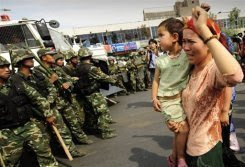
The exiled leader of China's Uighurs said Wednesday nearly 10,000 of her people were detained or killed this month in ethnic unrest and appealed for the United Nations to investigate their fate.
Rebiya Kadeer, the US-based head of the World Uighur Congress, also said she was "perplexed" at the muted US response to the violence as she spoke during a visit to Japan that has drawn angry protests from Beijing.
Citing local sources and speaking through an interpreter, she said almost 10,000 people "disappeared" in one night on July 5 when authorities cracked down on the unrest in the mainly Muslim region of Xinjiang.
"Where did those people go?" she said. "If they died, where did they go?"
Kadeer, 62, said Chinese police opened machine-gun fire at Uighur people after dark once the electricity was turned off, and that the following morning large numbers of Uighur men had gone missing.
"Uighur people who were there must have been either killed or taken away," she told a Tokyo press conference. "The next morning, the streets were cleaned and the bodies of ethnic Han (Chinese) were left in the streets."
Kadeer said she had asked Japanese lawmakers during a meeting Wednesday to push for a UN investigation.
"I want to urge the international community to dispatch an independent, third-party investigation mission to investigate what happened," she said.
"If China can confidently say that the Uighur people are at fault, then open up the area, tell the third-party commission what really happened."
Beijing accuses the mother-of-11 and grandmother of being a "criminal" and a separatist who instigated the unrest -- which the government says left 197 people dead, most of them Han Chinese killed by angry Uighur mobs.
China has said police opened fire to prevent further bloodshed, killing 12 "mobsters," according to state media reports, and that more than 1,400 people were detained for their involvement in the unrest.
Kadeer said she was not involved in fomenting the riots, which came after Uighur protests over violent clashes at a factory in southern China.
"If China says I did it, I want them to show evidence," she said. "If the international community judges it as evidence, I would acknowledge that."
Kadeer instead charged that "the responsibility lies with the authorities who changed what was a peaceful demonstration into a violent riot".
"For Uighurs, taking part in demonstrations is like committing suicide."
Kadeer -- who was jailed in China from 1999 to 2005 and now lives in exile in a suburb of Washington -- was on a three-day visit in Japan.
China said on Wednesday that it had summoned Japan's ambassador in Beijing to protest Kadeer's visit to Tokyo.
In Washington, China's vice foreign minister Wang Guangya on Tuesday said his side had asked the United States to "restrain and prevent" anyone from using its soil to conduct "separatist activities against China".
He also said Beijing had "expressed our appreciation for the moderate attitude of the United States so far" to the Xinjiang unrest.
Kadeer said she was "perplexed and disappointed" by the US response, saying it had been "somewhat cold".
But she added: "I do not believe the United States will remain quiet. I believe it will respond in an appropriate way."
China has also complained to Australia over a planned visit next week by Kadeer, the foreign affairs department in Canberra said Wednesday.
Kadeer is due to attend the August 8 launch in Melbourne of the documentary "10 Conditions of Love", which depicts her life story and which prompted Chinese attempts to have it pulled from the city's film festival.
Kadeer on Tuesday drew support from the Dalai Lama, who told an audience in Warsaw that Kadeer shared his belief in non-violence and was not seeking a separate state.
Speaking on the Xinjiang situation, the exiled Tibetan spiritual leader said: "Using force, this will never bring genuine harmony. Harmony must come based on trust, and trust you cannot bring by a gun."
share on: facebook
No comments:
Post a Comment